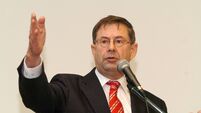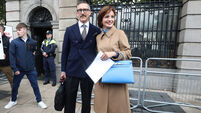People who preach about politicians lying are liars themselves — we all are
The Commons, particularly the Conservative side, is in a chronic state of shock: Imagine. He LIED to us.
It's a bit like the Profumo affair, where Profumo got his walking papers, not because he'd been bonking a prostitute who was also bonking a high-ranking Soviet official and perhaps pillow-talking national secrets to him, but because Profumo lied to the House about it.
Which ignored two realities:
1) The general public assumes politicians lie all the time, not just on special occasions.
2) The general public probably lies more often, per capita, than politicians do.
Politicians actually lie LESS often than the rest of us. Not more often.
This is partly because politicians' words are recorded, whether by stenographers in the houses of parliament or by media more frequently than the words of any other single group. Knowing that those square-collared microphones are going to be shoved in front of you concentrates the mind wonderfully.
It is possible to produce manifestoes from past years and point triumphantly to promises made in those manifestoes but never delivered on. A corollary is the business plan developed in order to get finance from the bank before the set-up of an enterprise, extension or project. Business plan promises are rarely fulfilled, but that doesn't back-taint them as lies.
Political promises are just human pledges, with the inherent risks attendant upon any honestly-intended vow. Every year, individuals decide to lose a stone, give up smoking, be faithful from now on, stop wasting money, never use the F word again. Yet Ireland is full of the fat, foul-mouthed fag-smoking unfaithful and the Governor of the Central bank isn't sleeping at night because of the debt on our credit cards.
To propose that politicians are actually more truthful than the rest of us is not to propose they are more virtuous. They are just more observed and recorded than anybody else. Even those extra pressures can't keep all of them honest, and so you have public representatives who will make impassioned party-line speeches and then sneak off to the sectoral group offended by those speeches and let on that they, personally, don't agree with what they said, but had no choice but to say it. However, when members of the general public complain about politicians lying, they are conflating a few much-publicised examples into a generality, or exemplifying Lenin's point that people always have been and always will be stupid victims of self-deception in politics.
Self-deception on the part of the listener is frequently at the root of accusations of lying on the part of politicians. A well-placed political silence can mislead much more than an articulated falsehood, and politicians who don't know how to use silence to imply an absent acquiescence don't survive long.
The people who yell about politicians lying are liars themselves. We all are.
Research suggests that ordinary decent people lie fifteen or more times an hour. Casually. Socially. We tell people we're glad to see them when we wish them in furthest Mongolia. We tell friends it'll be no bother when the imposition of the task has us bubbling with resentment.
We say a fat guy in red with a sack of goodies comes down our chimney when half of us don't have a chimney, coincidentally buy just the presents we don't need to buy if he's on his way with his sack, and lie to ourselves about the whole thing being a lie with the claim that it's just contributing to the magic of childhood.
LIES are the lubricant of civilized living. We punish children for lying, yet every family has its own legend of the horror visited upon it when one of the children told the truth to some aunt who owned a hairy mole. We excuse our lies as harmless because well-intended. We lie even when we don't have the skill to make it work. A friend of mine who's had a colostomy is lied to all the time by people who assure her it's no bother at all, these days. She's given up being pleasant about their lie.
"If a colostomy bag is such a great accessory," she now says, through gritted teeth, "I'll lend you mine, any time."
Joe Eszterhas, the scriptwriter who wrote Flashdance and other hit movies, says Hollywood has its own list of daily lies, including "You look terrific! I was working with Kubrick when he died. I never read my reviews. I'll read your script tonight. I really respect his artistic integrity. I'll read your script tomorrow. It's not about the money. This is just a suggestion I'll read your script at the weekend. You know I love you."
Attributing the habit of lying to politicians, the one group who cannot safely lie at all because they are much more likely to be found out in a lie than the rest of us, is a form of denial and scapegoating. We feel better if politicians look worse.
Now, undoubtedly, politicians DO lie. They would not qualify as humans if they didn't. Sometimes, they're given a free pass on lying. A Minister for
Finance has always been allowed to lie, in advance of devaluation of a currency, although this, since the Euro, doesn't happen any more. In war, we expect truth to be "surrounded by a bodyguard of lies" both verbal and physical. In political contests, deception doesn't seem to count as untruth. When Albert Reynolds recounted, in the recent Haughey documentary, how he'd instructed many of his supporters not to "show their hands" in other words, to pretend they weren't on his side when in fact they were nobody was bothered by this.
Undifferentiated outrage about untruth is satisfying but spurious. All lies are not the same. Some preserve, some destroy. The man who became Pope John XIII falsified baptismal certificates during the war in order to save the life of Jewish children. During the same period, William Shirer, a reporter in Nazi Germany, was absorbing the constant reiteration of the Big Lie against Jews.
"It was surprising and sometimes consternating," he later wrote, "to find that notwithstanding the opportunities I had to learn the facts and despite one's inherent distrust of what one learned from Nazi sources, a steady diet over the years of falsification and distortions made a certain impression on one's mind and often misled it."
All lies do not damage. All truth does not heal or help. Let's not forget the encounter between an inebriated Churchhill and a sober Bessie Braddock.
"Winston," she said, "You're drunk."
"Bessie," he responded, "You're ugly. But I shall be sober tomorrow."





